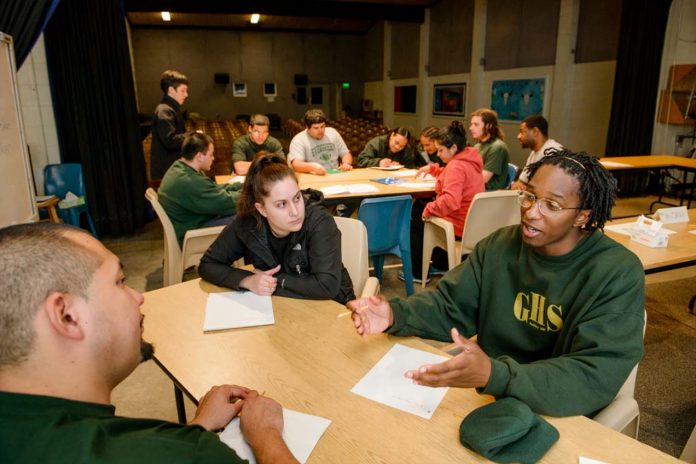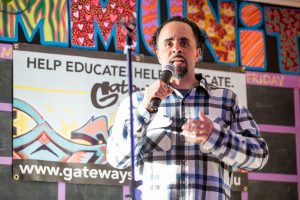
We all make mistakes growing up. But for some, breaking the law while under the age of 18 means time spent behind bars. The ACLU reports that “On any given day, nearly 60,000 youth under age 18 are incarcerated in juvenile jails and prisons in the United States.” At The Evergreen State College, faculty, staff and students work together to form new paths through Gateways for Incarcerated Youth.

Gateways is based at Evergreen’s Center for Community Based Learning and Action, and allows Evergreen’s faculty members to offer no-cost classes twice a week at nearby correctional facilities. Evergreen students learn alongside youth at the facility and engage as academic mentors. The program is vital to keeping youth caught up and motivated, so they don’t fall behind. Attendees can earn high school or college credits.
Dr. Maria Isabel Morales is part of the Gateways faculty. While many things have changed in this recent era of COVID-19, some remain the same. “The program, this quarter, has been unlike any other time,” she explains. “The heart of this program is the model it draws from: popular education. Traditionally, Olympia Evergreen students gather with Green Hill students and collaborate to decide the topics for workshops, these topics are decided upon based on the Green Hill student’s interests. That is what popular education is about—learning that is collaborative, equitable, and directly connected to the interests, lived experiences, and realities of the students involved.”
“I feel incredibly honored and grateful that I am teaching this program this year even if the pandemic has not allowed for it to be the way it has always been,” said Morales. “I am grateful for the lessons I’ve learned about being flexible, creative, and accepting change. I’ve learned that in order to survive and thrive under the difficult circumstances, we just have to keep on moving, like the river, and adapt, adapt, to the changes and struggle, but we can’t do this alone, we have to do this in community.”

Evergreen grad Kate Murphy continued working with Gateways after graduation thanks to a contract with the College Access Corps branch of AmeriCorps. She appreciates the interplay of learning and creativity, openness and flexibility. “My favorite part of Gateways is getting to know each other in creative, relaxed ways,” shares Murphy. “I think it’s amazing that we create a college-level learning environment inside of a locked facility, but even more special is that we can create a learning community that is so focused on who we actually are and what we want to know, not what we should be learning.
“Some of my favorite workshops in my time with Gateways have been the ones where we get to be the most creative: making pasta from scratch with the youth in their ‘home ec’ room where we used empty water bottles as rolling pins, learning how to braid hair by practicing with thick yarn taped to our tables, making ceramics together with the clay and a few tools to share, and practicing our breathing and meditation together. These are all special learning moments that a traditional classroom doesn’t invite or value but are a core part of how we build community in Gateways.”
Summer Hendrickson applied to Evergreen as soon as she read about Gateways. “Before coming to Evergreen I had been working with young adults who were experiencing homelessness as a Rapid Rehousing Case Manager,” she says. “Many of the young people that I worked with had previously been incarcerated, which for many led to them being homeless. Working with this population and seeing the connections between homelessness and incarceration I started to think about working within the juvenile justice system. The Gateways program gave me the opportunity to learn more about mass incarceration and the impacts incarceration has on not just the individual but communities.”

Working with Gateways students has influenced Hendrickson’s life. “Through this program I got to see the inside of a prison and see a little of what these men experience every day,” she says. “This program honestly changed my life. I got to learn with and be in a community with some amazing people. If I hadn’t been in this program, I wouldn’t have learned about the amazing things these men are doing, advocating for legislative changes that impact youth like them. I wouldn’t have seen the system the way I do now and want to help to make changes to it.”
We can get wrapped up in our own little corner of creation. But opportunities like these are eye opening. “This is a very important program for everyone involved,” says Hendrickson. “It not only gives college credit to those who otherwise wouldn’t have the option but opens the free world to see what it is like to be incarcerated. And to see that these young men are like us that they have similar music taste, favorite foods, hobbies, even growing up in the same towns. But what I feel is most important, it shows that how society views people who are currently or have been incarcerated is not who they really are.”
Since 1996, the Gateways program has helped more than 1,000 youth in our area. Read more about how the program works then consider getting involved through financial donations, in-kind gifts or volunteering. If you can’t commit to attending classes, why not host an event to raise awareness, invite staff to speak to your organization or coordinate a donation drive? You can even purchase Gateways merchandise to show the world you care. Call program staff directly with questions at 360-867-6025.
Sponsored











































